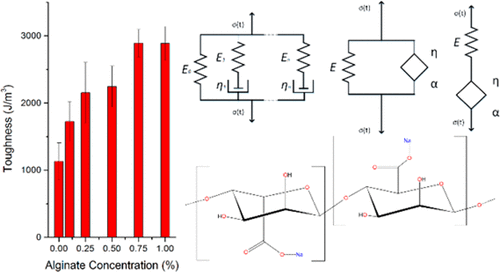当前位置:
X-MOL 学术
›
ACS Biomater. Sci. Eng.
›
论文详情
Our official English website, www.x-mol.net, welcomes your feedback! (Note: you will need to create a separate account there.)
Sodium Alginate Toughening of Gelatin Hydrogels
ACS Biomaterials Science & Engineering ( IF 5.8 ) Pub Date : 2017-11-29 00:00:00 , DOI: 10.1021/acsbiomaterials.7b00321 Michael A. Samp 1 , Nicolae C. Iovanac 1 , Adam J. Nolte 1
ACS Biomaterials Science & Engineering ( IF 5.8 ) Pub Date : 2017-11-29 00:00:00 , DOI: 10.1021/acsbiomaterials.7b00321 Michael A. Samp 1 , Nicolae C. Iovanac 1 , Adam J. Nolte 1
Affiliation

|
Gelatin is a popular material for the creation of tissue phantoms due to its ease-of-use, safety, low relative cost, and its amenability to tuning physical properties through the use of additives. One difficulty that arises when using gelatin, especially in low concentrations, is the brittleness of the material. In this paper, we show that small additions of another common biological polymer, sodium alginate, significantly increase the toughness of gelatin without changing the Young’s modulus or other low-strain stress relaxation properties of the material. Samples were characterized using ramp-hold stress relaxation tests. The experimental data from these tests were then fit to the Generalized Maxwell (GM) model, as well as two models based on a fractional calculus approach: the Kelvin–Voigt Fractional Derivative (KVFD) and Fractional Maxwell (FM) models. We found that for our samples, the fractional models provided better fits with fewer parameters, and at strains within the linear elastic region, the linear viscoelastic parameters of the alginate/gelatin and pure gelatin samples were essentially indistinguishable. When the same ramp-hold stress relaxation experiments were run at high strains outside of the linear elastic region, we observed a shift in stress relaxation to shorter time scales with increasing sodium alginate addition, which may be associated with an increase in fluidity within the gelatin matrix. This leads us to believe that sodium alginate acts to enhance the viscosity within the fluidic region of the gelatin matrix, providing additional energy dissipation without raising the modulus of the material. These results are applicable to anyone desiring independent control of the Young’s modulus and toughness in preparing tissue phantoms, and suggest that sodium alginate should be added to low-modulus gelatin for use in biological and medical testing applications.
中文翻译:

明胶水凝胶的海藻酸钠增韧
明胶由于其易用性,安全性,较低的相对成本以及易于通过使用添加剂来调节物理性能的特性,因此是制造组织模型的一种流行材料。当使用明胶时,特别是在低浓度时,出现的一个困难是材料的脆性。在本文中,我们表明少量添加另一种常见的生物聚合物海藻酸钠可显着提高明胶的韧性,而不会改变材料的杨氏模量或其他低应变应力松弛特性。使用斜坡保持应力松弛测试对样品进行表征。然后将这些测试的实验数据拟合到通用麦克斯韦(GM)模型以及基于分数演算方法的两个模型中:开尔文-沃格分数阶导数(KVFD)和分数麦克斯韦(FM)模型。我们发现,对于我们的样品,分数模型提供了更好的拟合,但参数较少,并且在线性弹性区域内的应变下,藻酸盐/明胶和纯明胶样品的线性粘弹性参数基本无法区分。当在线性弹性区域之外的高应变下进行相同的斜坡保持应力松弛实验时,我们观察到随着藻酸钠添加量的增加,应力松弛向较短的时间尺度转变,这可能与明胶中的流动性增加有关矩阵。这使我们相信海藻酸钠可增强明胶基质流体区域内的粘度,提供额外的能量耗散而不会提高材料的模量。这些结果适用于任何希望独立控制制备组织模型的杨氏模量和韧性的人,并建议将藻酸钠添加到低模量明胶中,以用于生物和医学测试应用。
更新日期:2017-11-29
中文翻译:

明胶水凝胶的海藻酸钠增韧
明胶由于其易用性,安全性,较低的相对成本以及易于通过使用添加剂来调节物理性能的特性,因此是制造组织模型的一种流行材料。当使用明胶时,特别是在低浓度时,出现的一个困难是材料的脆性。在本文中,我们表明少量添加另一种常见的生物聚合物海藻酸钠可显着提高明胶的韧性,而不会改变材料的杨氏模量或其他低应变应力松弛特性。使用斜坡保持应力松弛测试对样品进行表征。然后将这些测试的实验数据拟合到通用麦克斯韦(GM)模型以及基于分数演算方法的两个模型中:开尔文-沃格分数阶导数(KVFD)和分数麦克斯韦(FM)模型。我们发现,对于我们的样品,分数模型提供了更好的拟合,但参数较少,并且在线性弹性区域内的应变下,藻酸盐/明胶和纯明胶样品的线性粘弹性参数基本无法区分。当在线性弹性区域之外的高应变下进行相同的斜坡保持应力松弛实验时,我们观察到随着藻酸钠添加量的增加,应力松弛向较短的时间尺度转变,这可能与明胶中的流动性增加有关矩阵。这使我们相信海藻酸钠可增强明胶基质流体区域内的粘度,提供额外的能量耗散而不会提高材料的模量。这些结果适用于任何希望独立控制制备组织模型的杨氏模量和韧性的人,并建议将藻酸钠添加到低模量明胶中,以用于生物和医学测试应用。



























 京公网安备 11010802027423号
京公网安备 11010802027423号